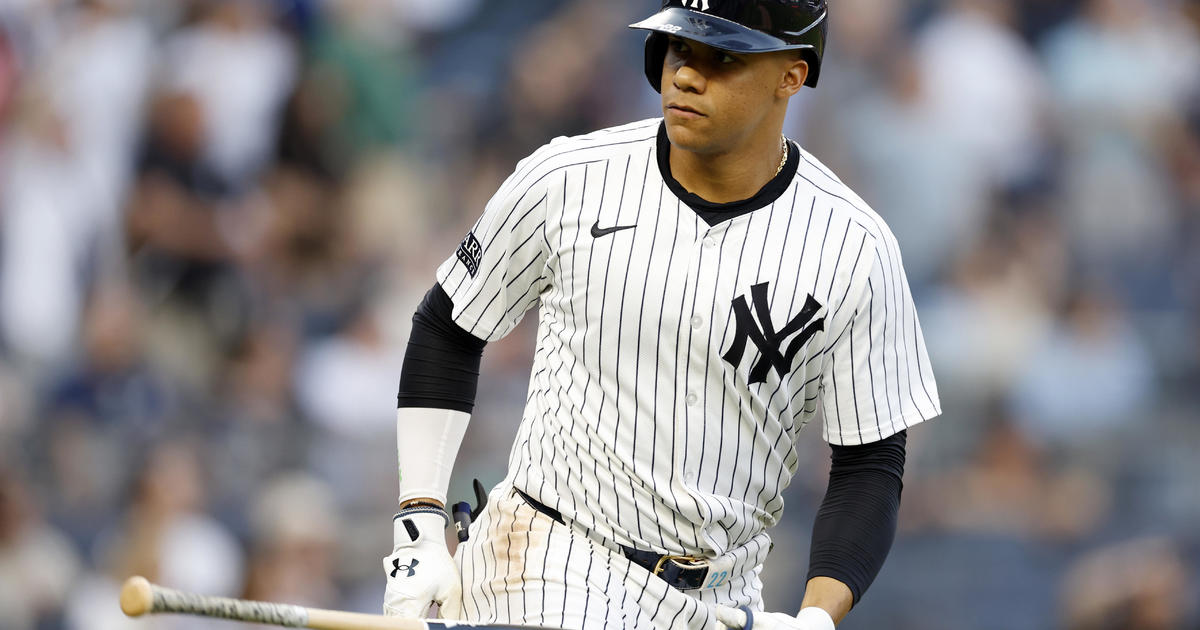Iconic Sports Personality #6: George Steinbrenner
George Steinbrenner bought the lackluster New York Yankees in 1973, during the team's steep decline. Historically the team to beat, it looked like the Yankees' glory days were irretrievable when Steinbrenner's money machine stepped in. He purchased the club from CBS for $8.8 million. Vowing to keep his nose out of the club's day-to-day affairs, Steinbrenner did just the opposite, ruling on everything from personnel hires and firings to the placement of water coolers. Was he an evil genius or the savviest businessman to ever hit the game? You decide.
⇒ Complete 1010 WINS Iconic New York Series ⇐
Early Life
Steinbrenner was born in Ohio in 1930. A strict disciplinarian, his father loomed large over his childhood. Steinbrenner was pushed to succeed at all costs in all endeavors, but was also taught the value of working hard. As a young boy, Steinbrenner's allowance was comprised of chickens instead of money. The enterprising child took it upon himself to open "The George Company" at nine years old, where he sold eggs door to door in his neighborhood. The business was more than a child's hobby. It became a successful enterprise which financially supported his sisters later on in life.
Steinbrenner's father had been a track and field athlete, and his love of sports affected Steinbrenner as a teen. Never interested in playing, Steinbrenner was the sports editor of his college newspaper and headed up the sports program at Lockbourne Air Force Base, where he served as a second lieutenant. After discharge, he continued to focus on sports, becoming a football coach for a brief stint. However, his father intervened and attempted to force the young man into the family's shipping business. Steinbrenner, however, had other ideas.
Business Mogul
In 1960, Steinbrenner bought the Cleveland Pipers, a minor league basketball team, on his own dime. The endeavor proved disastrous. Within two years the Pipers collapsed, costing Steinbrenner millions. Unfazed, he sharpened his teeth and business acumen on the American Ship Building Company, purchasing majority shares and becoming its president. Still unsatisfied, Steinbrenner continued to pursue his dream of owning a winning team.
A Baseball Empire Begins
Steinbrenner set his sights on the Cleveland Indians, but was unable to procure them when another team captured his fancy. The former powerhouse New York Yankees were flailing under disastrous leadership, losing game after game and hemorrhaging fans. Steinbrenner and a team of investors scored the crippled team for $8.8 million.
Steinbrenner promised a hands-off approach, leaving personnel decisions to Gabe Paul and Lee MacPhail. Paul was a businessman with vast experience in baseball, who had also helped Steinbrenner with the team purchase. MacPhail was the holdover general manager from the former regime. Steinbrenner's promise was short-lived. He quickly became enmeshed in all aspects of team decisions, especially hires and fires. He heralded in a new era of spending, starting with the acquisition of star pitcher Catfish Hunter and manager Billy Martin. Trouble, however, was on the horizon.
Troubling Times Lay Ahead
Steinbrenner was caught using corporate funds by faking employee bonuses in order to make illegal corporate contributions to President Richard Nixon's re-election campaign. He also attempted to intimidate employees who worked for his ship building company to lie about it to a grand jury. He pleaded guilty to one felony and one misdemeanor, at which point he was suspended by MLB Commissioner Bowie Kuhn for two years. The term was later dropped to 15 months. Steinbrenner was forced to pay a hefty fine, but served no jail time. He also received a pardon from Nixon during his last days as president.
Steinbrenner sunk his teeth back into the team when the suspension was lifted, and the underdog Yankees started to taste success again, winning their first pennant in 12 years and resurrecting a powerful fan base in New York.
The wins continued, but so did Steinbrenner's micromanagement. He was known to send players back to the minors as punishment and started many games with lengthy (and sometimes offensive) locker-room diatribes. He became known for constant hires, firings and re-hires of managers and other key players.
A Scandalous Legacy
In 1990, Steinbrenner found a new target in Dave Winfield, in what would become known as one of Major League Baseball's greatest scandals. He zeroed in on Winfield with a vengeance, feeling duped by Winfield's 1980 contract negotiations when the outfielder was signed as a free agent. (Winfield was able to negotiate a higher contract due to a "cost of living" clause, for which Steinbrenner never forgave him.) Looking for dirt on the right fielder, he paid nefarious gambler Howard Fera $40,000 to find what he could. The incident resulted in Steinbrenner's second ban, this one for life, from the sport he loved so much. However, three years later he would wrestle his way back in.
Slowing down, Steinbrenner left much of the team's management at that point to his sons, Hal and Hank. He died of a massive heart attack at the age of 80 in 2010.
⇒ Complete 1010 WINS Iconic New York Series ⇐
Corey Whelan is a freelance writer in New York. Her work can be found at Examiner.com.




